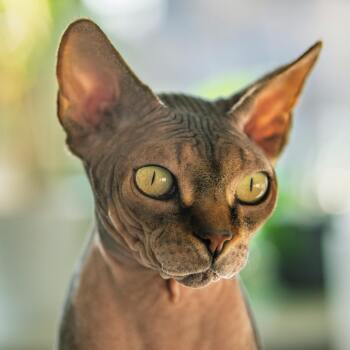Sphynx

If you’re lucky enough to share your life with a Sphynx, you already know—they’re not just cats, they’re a full-blown experience. Equal parts performer, cuddlebug, and personal assistant, these hairless wonders are unlike any other feline you’ll meet. One minute they’re perching on the highest shelf, the next they’re curled under your blanket like a purring hot water bottle.
What Makes Sphynxes So Special
These cats redefine companionship. Social, outgoing, and delightfully quirky, Sphynxes want to be part of everything—from Zoom calls to laundry folding to, well, your lap… especially your lap.
They’re known for their intelligence and playful energy, often mastering tricks or games that would impress any dog. Sphynxes aren’t shy about sharing their thoughts either; they’re vocal, expressive, and have no problem letting you know it’s dinner time—or cuddle time.
And while their lack of fur might be the first thing you notice, it’s their giant hearts and bold personalities that really leave a lasting impression.
A Few Quirks You Should Know
With no fur to insulate them, Sphynxes are heat-seeking snuggle machines. You’ll often find them basking in sunbeams, under blankets, or borrowing body heat from their humans. They’re also not fans of being left alone for long stretches and can develop separation anxiety without proper stimulation or companionship.
And yes—they do require grooming. Without fur to absorb oils, Sphynx skin needs regular baths to stay clean and healthy. Their ears and nails also need frequent attention to keep wax and buildup at bay. Consider it part of your quality bonding time!
From Canada With Love
The Sphynx breed began as a natural mutation in domestic short-haired cats in the 1960s, with further development involving the Devon Rex to maintain health and that signature look. Though they might seem exotic, these cats are all about staying close to home—and preferably right next to you.
Genetic Health Concerns for Sphynx Cats
- Hypertrophic Cardiomyopathy (HCM)– Sphynx cats are genetically predisposed to this common form of heart disease, where the heart muscle thickens and affects function. While symptoms like rapid breathing or lethargy can be subtle, routine vet checkups and heart screenings (including genetic testing, if available) are your best defense.
- Feline Aortic Thromboembolism (FATE)– Cats with heart issues may be at risk for blood clots that block circulation to the hind legs. If your cat suddenly shows weakness or pain in the back limbs, this is a medical emergency. Preventative medication may be recommended for cats with known heart disease.
- Blood Type Awareness– Sphynxes often have type B or AB blood, which can complicate transfusions if not known in advance. Testing your cat’s blood type during regular vet visits can be a critical safety measure—especially for purebreds.
- Neonatal Isoerythrolysis (NI)– Breeders should be aware of this serious condition, which occurs when kittens with a different blood type than their mother suffer a fatal immune response after nursing. Pre-breeding blood tests for both parents can prevent this tragic scenario.
- Alopecia & Skin Management– Yes, even hairless cats deal with skin problems. Oily buildup, acne, and clogged pores can develop without proper hygiene. Weekly baths, ear cleaning, and nail care are essential to keep your Sphynx healthy and comfortable.
- Urticaria Pigmentosa– This skin condition causes red, itchy bumps and irritation. It may be genetic and can be managed with veterinary guidance. If your cat seems unusually itchy or develops frequent skin flare-ups, don’t wait—early intervention makes a big difference.
Ready to Learn More? We’re Here to Help!


